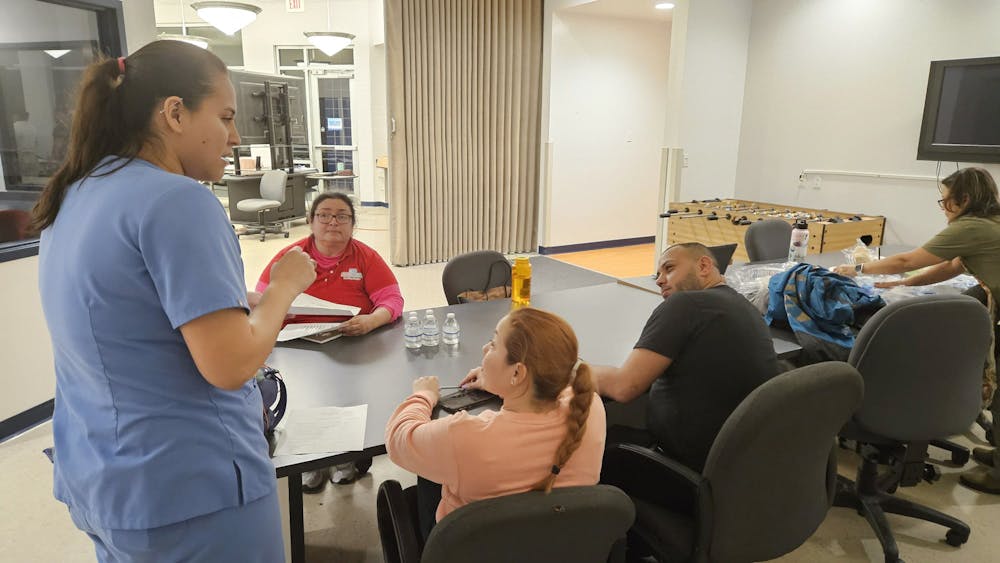Many non-English speakers arrive in the country without knowing basic things about the language, which creates problems when they can’t communicate with native English speakers.
The Latina Women’s League aims to empower the local Hispanic community through a variety of educational events and community activities.
On Jan. 25, the league began teaching English classes for immigrants at HealthStreet to provide support to those who came to the United States without knowing the language.
“I think it is helping [people] a lot, because many people don't know how to say very simple words,” said Ericka Ghersi, the 48-year-old league president. “So it is giving them the security of being able to speak because knowing some words, it already gives you a little security to continue speaking…we are like the mothers who help the child to walk, like that, then they can run.”
While the students are mostly Spanish-speaking immigrants, the classes are not exclusively for them. Ghersi said the English classes are for anyone interested.
“[The classes are] for anyone, any gender, any country,” Ghersi said. “It just so happens that the majority are Latin Americans, but it's just a coincidence, but it's for everyone.”
Coming to the U.S. from a third-world country can induce culture shock for immigrants, Ghersi said.
“Coming here without a language that you don't know is a strong shock,” Ghersi said. “And coming here in a language that you don't know and with so much technology that you have never used in your country, like for example washing clothes in a washing machine, or washing your dishes in a dishwasher.”
Ghersi, who is also an immigrant, started the classes because she knows how it feels for immigrants who can’t speak English.
“If I have those tools to explain to people the things they should avoid, why not teach them?” Ghersi said. “Because I will be so selfish to think that they must suffer like I suffered.”
Almost 50 people have signed up for English classes run by volunteers on Tuesdays and Thursdays. Some of the volunteers are students like Alejandro Ramírez, a UF psychology junior.
“I have always had a passion for teaching English to Spanish speakers,” Ramírez said. “My mom is one of those people. Since I was little I have been her interpreter, as she has not spoken English since she arrived in this country 20, 30 years ago. She now speaks a little English, but she kind of inspires me to teach other people.”
Ramírez said students don’t need to attain perfect English to be successful.
“As long as they learn some things,” Ramírez said. “Even if it gives them confidence to go to the American world and to be able to speak English without fear, I'm fine with that.”
Other volunteers and coordinators helped organize the registration list and gave the first English class to the 22 students present.
Viana Bravo, a 22-year-old UF alumna and league administrative coordinator, said the students were in dire need of language classes.
“There are some people that do not know any English,” Bravo said. “They know how to say their name, they know how to say hi, and that's about it. And if you know anything about being in this country, that doesn't get you very far.”
Those who don’t speak English often experience discrimination for not being native and not knowing the language. While the fight against xenophobia continues, the perceived ideal for immigrants is to integrate through language.
“There's sometimes a lot of backlash when you talk in Spanish in public places,” Bravo said. “Most people find that offensive, but I find that as like that's our nature. It's our language. It's the way we connect to who we are, where we came from.”
With help from the Latina Women’s League, immigrants are allowed to integrate into American culture safely and freely.
“The goal is to hopefully help them gain confidence and knowledge about the English language,” Bravo said. “So that they don't have to feel that scary feeling of, ‘I don't know what to say, I don't know what to do, I don't know how to say this.’”
Lisette Hidalgo, one of the English students present Jan. 25, felt the class was especially impactful given students could learn English for free.
“I'm not 100% bilingual,” Hidalgo said. “I have some knowledge, but I had not used English for so long … I came to class to refresh and update the pronunciation and the words I had not used for a long time, and then it is necessary to refresh and begin to activate the use of my English day by day.”
The possibility of learning the native language at no cost has been a relief for many immigrants.
The league doesn’t ask for documents, as it wants to provide help to those who need it most, said Ghersi. She believes helping a person can positively influence them and spread generosity.
Contact Laura Quintana at lquintana@alligator.org. Follow her on X @LauraCQuintana1.
Laura Quintana is a third year Journalism major. Spring 2024 is her first semester working at The Alligator. Some of the things she likes to do is read, write, and take pictures. Her biggest goal is to become a novelist and travel the world.






